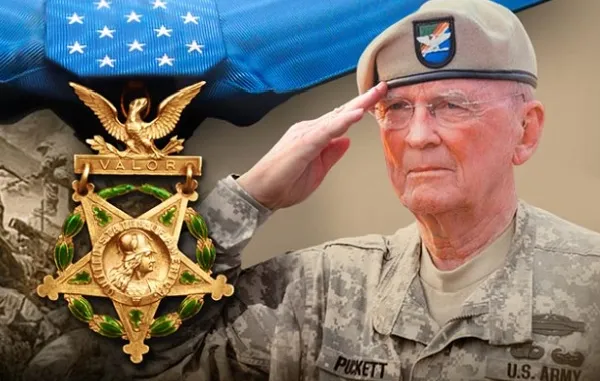Reflections from Tom Mundell, the president and CEO of the National Medal of Honor Center for Leadership, on the legacy of Medal of Honor Recipient
Col. Ralph Puckett, Jr.
Patriotism can be a slippery slope.
Many of us were brought up to equate patriotism with saying
the Pledge of Allegiance, reading the Declaration of Independence and the
Gettysburg Address, and waving the Stars and Stripes on the Fourth of July. The
underlying belief was “my country, right or wrong.”
Today, many of these fundamental beliefs about patriotism
are being questioned or even rejected by some whose frustrations about the
direction of the nation are boiling over. It seems as if we can’t agree on even
the simplest things, let alone the true definition of patriotism.
But a recent memorial service for a great man showed that America
produces patriots who embody values that all of us can share. It’s these values
that remind us that we may have differences but we’re all Americans. It’s these
values that define true patriotism.
Army
Col. Ralph Puckett, Jr., wasn’t flashy. He didn’t seek recognition. He was
a West Point graduate who went to war, in this case in Korea in 1950, with a
group of Army Rangers. It was on Hill 205 overlooking the Chongchon River that
his life was changed.
To capture the hill, he ran across an open area three times
to draw enemy fire. Then, amid a Chinese counterattack that left Puckett’s
Rangers outnumbered 10-1, Puckett was wounded in his thigh, feet, buttocks, and
arm. To protect his men, Puckett ordered the Rangers to leave him behind and
abandon their position. Two other Rangers ignored the order, fought off three
Chinese soldiers, and evacuated Puckett. Despite his wounds, he called for
artillery fire to hit the hill.
Puckett was hospitalized for 11 months and was initially
awarded a Distinguished Service Cross for his actions that day. After the
Korean War, Puckett continued to serve his country, including a tour in Vietnam,
where he earned a second Distinguished Service Cross. It took 71 years, but
Puckett’s actions in Korea were eventually recognized with the Medal of Honor
in 2021.
By any standard, his selfless service to his country made
him a patriot. But what happened after he left the military was perhaps his
most patriotic act, for Puckett went home, raised a family, built a career and
volunteered in his community. He was a model citizen like so many others who
make up the everyday fabric of this nation.
Col. Puckett died on April 8, 2024 at the age of 97. He was the last surviving Medal of Honor Recipient from the Korean War.
Shortly after, Congress gave him one of its highest tributes – a lying in honor ceremony in the Capitol Rotunda. The ceremony brought together Republican and Democratic leaders from the House and Senate, along with Secretary of Defense Lloyd Austin and Gen. Charles Q. Brown, Jr., chairman of the Joint Chiefs of Staff.
Col. Puckett’s life and legacy demand that we strive to put these values to work for ourselves and for our communities so we can lead exemplary lives. I can’t think of a more patriotic act than that.
- Tom Mundell, President & CEO, MOH Center for Leadership
Sen. Mitch McConnell spoke of how on the eve of battle,
Puckett prayed, “Dear God, don’t let me get a bunch of good guys killed.” And House Speaker Mike Johnson, whose son will enter the U.S. Naval Academy this summer, told me how the values represented in the Medal of Honor need to be embraced by the nation’s young people now more than ever.
Those Medal of Honor values – courage, sacrifice, integrity, commitment, citizenship, and yes, patriotism, are the foundation of all that we are doing at the National Medal of Honor Center for Leadership. Our motivation is simple: To help people from all walks of life become better leaders in their workplaces, their communities and in their families using these core values.

Col. Puckett’s life and legacy demand that we strive to put these values to work for ourselves and for our communities so we can lead exemplary lives. I can’t think of a more patriotic act than that.